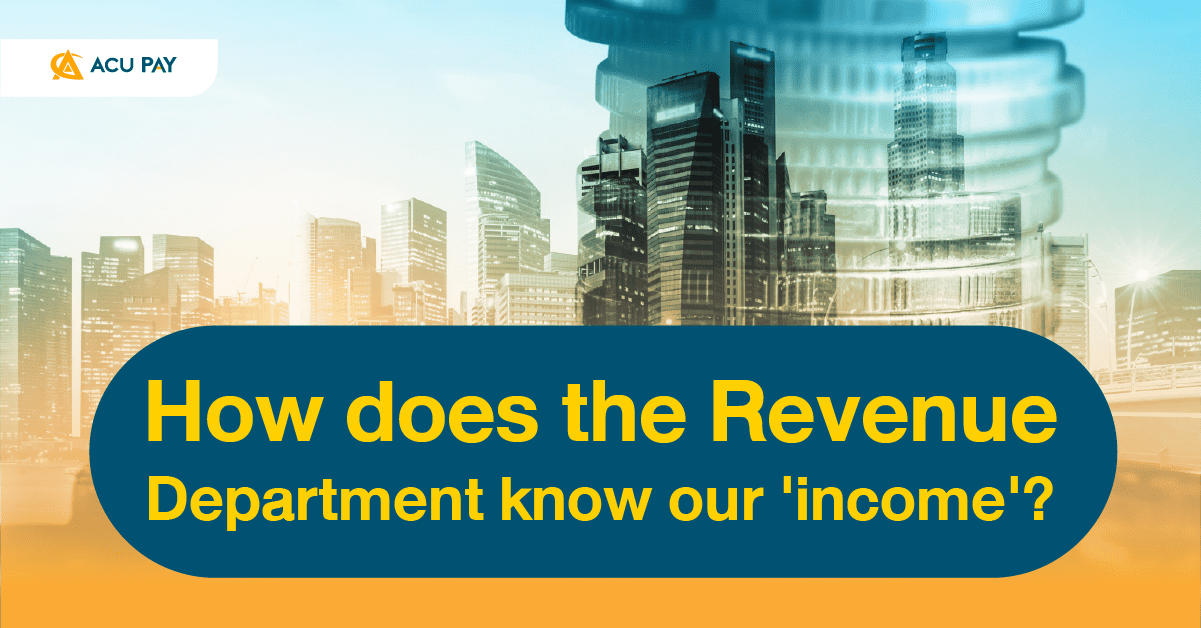

Anyone who has an idea that we need not to pay tax since the Revenue Department may not know about our income needs to prepare themselves because in fact the Revenue Department knows about our income from many channels. What are the channels that the Revenue Department used to check our income? Today. ACU PAY will explain it to you.
Even if the money is not transferred through the bank, the Revenue Service can check your income. Corporate employers must always pay withholding taxes and send them to the Revenue Department, including specifying the recipient’s name, and ID number in the tax deduction form.
If the payee company is investigated by the Revenue Department, the operator must submit a record of expenses to the Revenue Department. The expenditures must be detailed in the record and submitted with evidence of actual expenses such as tax invoices and receipts.
If there is a large amount of money in the account, whether from deposits or transferred via smartphone, or credit cards, the Revenue Department can know the details of the money that is coming in irregularly. According to the laws, financial service providers such as commercial banks, and government banks, including payment gateways or e-wallets, must report transaction information to the Revenue Department regardless of deposit or transfer. The conditions for sending data to the Revenue Department are as follows:
This will be counted annually from January 1 to December 31 of that year. The information submitted will only let the Revenue Department know the basic income, cannot be taxed because it must be processed with other information to consider whether you reach the criteria to pay tax or not.
Taxpayers are allowed to report tax irregularities, avoid paying tax, or inform new taxpayers who are not yet in the tax system via www.rd.go.th. When reports come in, the Revenue Department will continue to follow up.
It is an AI system developed by the Revenue Department to extract information from websites for analysis and verification and record it as a database. It can randomly check various online traders through information extraction, prices, and the number of products sold on e-commerce sites. In addition, the Revenue Department will also be able to obtain information from payers at our shops. For example, e-commerce websites such as Shopee and Lazada will deduct 20% or 30% of our total sales while e-commerce will send the tax invoice to us and the Revenue Department as well.
To examine the irregularities of which entrepreneurs are in the tax avoidance group and those in the good group, based on unusually high asset numbers or high salary workers among SMEs.
The Revenue Department also collects all forms of tax history along with external data such as the Department of Transportation, Electricity and Water Supply, etc., and then collects them to calculate the financial ratios and assess them as scores. If the scores are higher, there is more risk than those with lower scores. Data Analytics, for example, can be used to connect data with electricity and water supply. If Revenue finds that our electricity consumption and tap water are similar to those who do the same business, but they report higher incomes, we may be suspected that we do not submit complete income.
For any person who has never filed a tax, the authorities can exercise their authority to review tax for up to 10 years according to the Civil and Commercial Code. If a person files a tax before being subpoenaed, the audit authority of the Revenue Department will be reduced to five years. In case of no serious offense, the Revenue Department will conduct a back-up investigation for only up to two years.
To prevent the risk of being investigated by the Revenue Department, all citizens who meet the tax criteria should file their taxes properly. No matter how hard you try to avoid it, if the Revenue Department notices an abnormality, it can use its investigative powers at any time you might not expect.